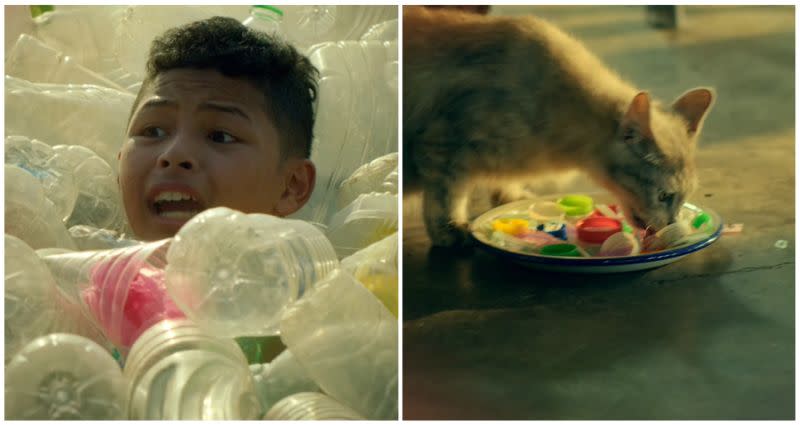
A Malaysian short film produced for World Environmental Day shares the horrifying normalization of plastic pollution.
The short film, “Plastik,” was developed by The MeshMinds Foundation and produced by Studio Birthplace, in partnership with the United Nations Environment Program’s SEA circular project. It was released on June 3 to promote environmentalism and make sure less plastic is wasted.
Directed and produced by Malaysian filmmakers Philip Rom and Sean Lin, the film is meant to spread awareness about the dangers of single-use plastic.
“Plastik” follows a little girl, portrayed by Aisya Sufiah, who discovers that she sees the world differently when she looks through the hole of a plastic bottle. When peering through her makeshift telescope, things like food and sand on the beach are replaced with plastic.
More from NextShark: Brave schoolchildren in China rescue pregnant teacher as she faints in class
Malaysia ranks eighth among countries that mismanage their plastic waste. Every year, Malaysians throw over 30,000 tons of plastic waste into the ocean. In water, plastic may take up to 400 years to completely break down.
In “Plastik,” the girl is in an outdoor restaurant, where a nearby vendor finds a white piece of plastic in the gills of ikan goreng, a fried fish dish. He picks out the plastic and flicks it away. The girl wraps her bottle with more colorful strips of plastic as a vendor serves a table of three. When the girl lifts up her bottle and looks into it, she sees the customers eat colorful plastic like noodles. Instead of juice, their glasses are filled with bottle caps and crumbled plastic.
The message from the two-and-a-half-minute film is deafening, showing the disturbing reality of plastic being virtually everywhere. This synthetic material that offers humanity cheap convenience has become intimately permeated within our food, our bodies and our ecosystems.
More from NextShark: Ground-level witness videos of Mount Semeru eruption show devastation of Indonesian villages
At the end of “Plastik,” the screen fades to black, followed by text that says: “Say no to single-use plastic. Together, we can #BeatPlasticPollution. On 2 March 2022, 175 nations backed a historic resolution at the UN Environment Assembly to End Plastic Pollution and commit to develop a legally binding agreement by 2024. It’s time we enhance shared responsibility to end plastic pollution because we have #OnlyOneEarth.”
Feature Image via @philip.rom
More from NextShark: Thai YouTuber discovers the only known bamboo-dwelling tarantula species in the world




